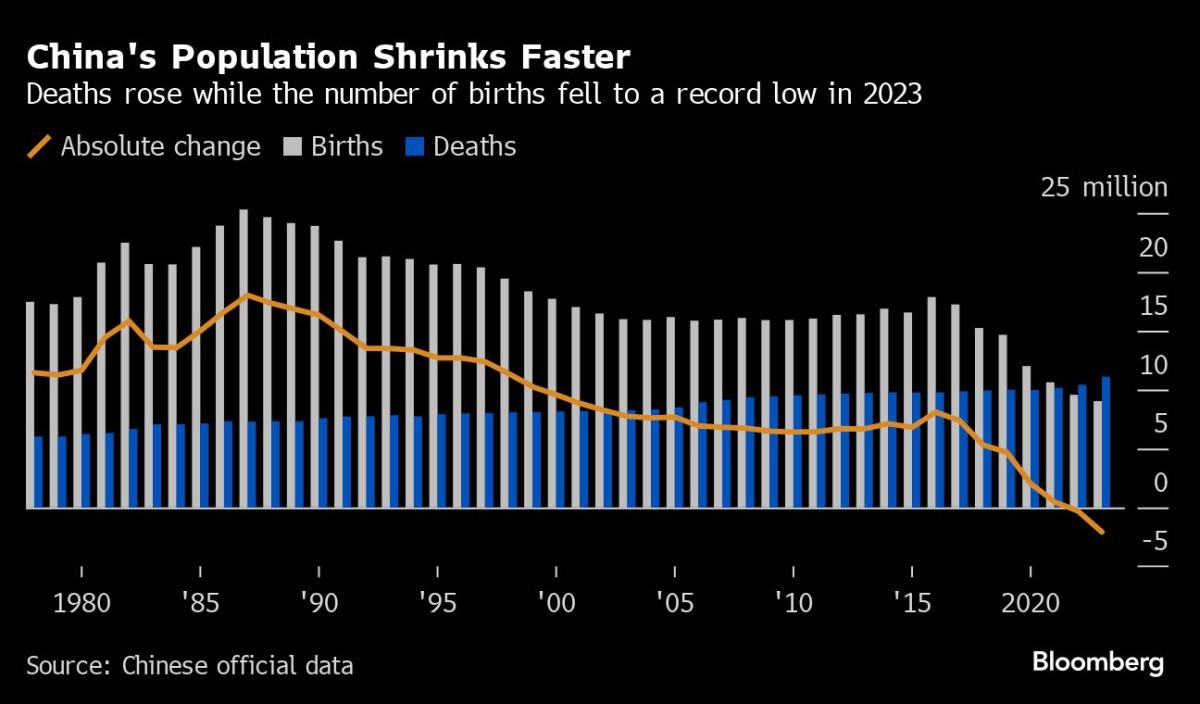China’s First Retirement Age Hike Since 1978 Triggers Discontent

(Bloomberg) -- China will raise the retirement age for the first time since 1978, a move that could stem a decline in the labor force but risk angering workers already wrestling with a slowing economy.
Most Read from Bloomberg
Top lawmakers endorsed a plan to delay retirement for employees by as long as five years, Xinhua News Agency reported Friday. Men will retire at 63 instead of 60. Women will retire at 55 instead of 50 for ordinary workers, and 58 instead of 55 for those in management positions.
The change will take place over 15 years starting January, and will allow more people to work longer. This could boost productivity to address the challenges of an aging population, although it risks adding to public discontent with the economy growing at the worst pace in five quarters.
“The timeline of raising the retirement age is pretty gradual. Policymakers probably have taken into account the potential negative impact and calibrated that carefully,” said Michelle Lam, Greater China economist at Societe Generale SA.
Shares of companies providing health and elderly care jumped, with Shanghai Everjoy Health Group Co. rising by the daily limit of 10%. Chalkis Health Industry Co. and Youngy Health Co. gained more than 6%.
“People may face more health problems if the retirement age is raised. And the pressure of supporting parents may require more elderly care institutions to share the burden,” said Shen Meng, a director at Beijing-based investment bank Chanson & Co.
China’s retirement age is among the world’s lowest despite significantly increased life expectancy over the decades. A bigger tax base and delayed access to benefits will relieve the pressure on the government to fund pensions as the elderly population rapidly expands.
The hike is aimed at “adapting to the new situation of demographic development in China, and fully developing and utilizing human resources,” according to the decision by the Standing Committee of the National People’s Congress.
The approval followed a July announcement by the ruling Communist Party that the retirement age will rise in a “voluntary, flexible manner.” Previous efforts to raise the threshold had failed in the face of public opposition.
What Bloomberg Economics Says...
“This is a big step toward countering a key drag on long-term growth — a shrinking working-age population. But it won’t turn the tide. Our long-term projections, which already factor in a bump in the retirement age, point to growth going down to about 1% by 2050.”
Eric Zhu, economist
Read the full note here
The Friday decision has left some people fuming over working into an older age, as well as those who fear greater competition in the job market.
“Are you asking me, when I’m 60, to compete with young people for jobs?” a Weibo user said on the X-like social media platform, where the news was the top trending item and garnered more than 530 million views as of Friday afternoon.
Some also complained about employers’ discrimination against older job candidates, a problem that the government has long vowed to address.
Authorities acknowledged the potential short-term pressure on the job market at a press briefing on Friday. Li Zhong, vice minister at the Ministry of Human Resources and Social Security, said the gradual pace of the change should lead to a “muted” effect on youth employment.
The top legislative body also ruled that starting 2030, workers will need to contribute to their pension accounts for a longer period before they’re eligible to receive payout. This requirement will increase gradually from 15 to 20 years.
“The sustainability of the pension system may be the main consideration behind the move,” said Ding Shuang, chief economist for Greater China and North Asia at Standard Chartered. “Even though the move will increase pressure for the job market, in the long term it helps mitigate the impact from declines in the working-age population.”
Lawmakers also called on officials to actively respond to the aging population, protect workers’ rights and improve elderly care. Additionally, it empowered the State Council, China’s cabinet, to adjust these measures as needed.
As China’s life expectancy has risen, delaying retirement has become more important to offset the demographic challenges from its decades-long enforcement of a one-child policy, which left a generation of single children supporting a large elderly population. Today, the average Chinese lives to 78 from 66 four decades ago.
People aged 65 and older are expected to make up 30% of the population by around 2035 from 14.2% in 2021, according to a report by state broadcaster CCTV on Tuesday. Authorities’ efforts to encourage births have so far done little to reverse the demographic shift, with birth rate falling to a record last year.
“When I was born they said there were too many. When I gave birth they said there were too few. When I wanted to work they said I was too old. And when I retire they say I’m too young,” another Weibo user said.
--With assistance from Fran Wang, Yujing Liu and Catherine Ngai.
(Updates with more comments, details throughout)
Most Read from Bloomberg Businessweek
©2024 Bloomberg L.P.
Breaking news
See all






